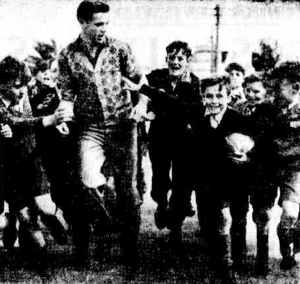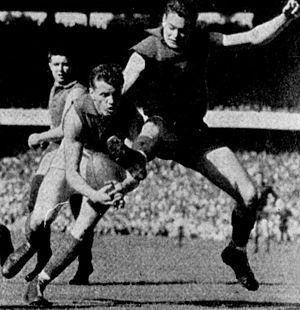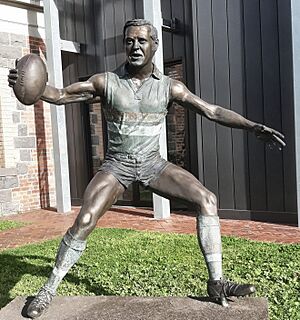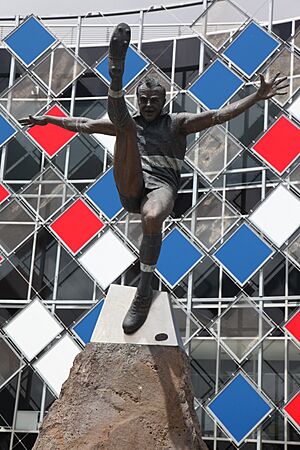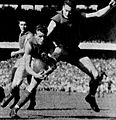Ted Whitten facts for kids
Quick facts for kids Ted WhittenOAM |
|||
|---|---|---|---|

Whitten after a training session in 1954
|
|||
| Personal information | |||
| Full name | Edward James Whitten | ||
| Nickname(s) | EJ, Mr Football, Teddy | ||
| Date of birth | 27 July 1933 | ||
| Place of birth | Footscray, Victoria | ||
| Date of death | 17 August 1995 (aged 62) | ||
| Place of death | Altona, Victoria, Australia | ||
| Original team | Braybrook/Collingwood Amateurs | ||
| Position(s) | Centre half back, centre half forward | ||
| Career highlights | |||
|
Club
Representative
Overall
|
|||
Edward "Ted" James Whitten Sr. (born 27 July 1933 – died 17 August 1995) was a famous Australian rules football player. He played for the Footscray Football Club in the Victorian Football League (VFL). He was known as "Mr. Football" because of his amazing skills and love for the game.
Ted grew up in Footscray, a working-class area in Melbourne. He joined the Footscray Bulldogs in 1951. He quickly became one of the best players in the league. He could play well in key positions like centre half-forward or centre half-back.
In 1954, Ted won his first of five club awards for being the best and fairest player. He was also chosen for the All-Australian team. This was the same year Footscray won its first VFL/AFL premiership, a huge moment for the club.
In 1957, Ted became the team's captain-coach. He led the club to another Grand Final in 1961, but they lost to Hawthorn. He played 321 games, which was a league record at the time. He retired from playing in 1970.
Ted loved State of Origin football, where players represent their home states. He played 29 games for Victoria. After he stopped playing, he became a popular football expert and commentator on TV and radio.
In 1991, Ted was diagnosed with prostate cancer. In 1995, when he was very unwell, he had a special farewell lap of honour at the Melbourne Cricket Ground. This happened during a State of Origin match. It is remembered as one of football's most unforgettable moments.
Ted Whitten was a true legend of Australian football. He was known for his powerful kicks and great ball skills. He was a hero in Melbourne's western suburbs. People admired him for his football talent and his fun, cheeky personality. He was inducted into the Sport Australia Hall of Fame in 1985. In 1995, he was made a "Legend" in the Hall of Fame. In 1996, he was one of the first "Legends" inducted into the Australian Football Hall of Fame. He was also chosen as captain and centre half-back in the AFL's Australian Football League#Team of the Century. Footscray's home ground was renamed Whitten Oval in his honour. The E. J. Whitten Legends Game is a charity match held every year to remember him and raise money for prostate cancer research.
Contents
Ted's Early Life
Ted Whitten grew up in the western suburbs of Braybrook and Footscray in Melbourne. As a young person, he played football for two different teams. He played for Braybrook on Saturdays and Collingwood Amateurs on Sundays.
A coach from Collingwood Amateurs, Charlie Utting, told Ted to try out for the Collingwood VFL team. But Ted was told to come back in a few years after he got stronger. Just 12 months later, he was playing for Footscray, the team he had always supported.
Ted's Football Career
Starting Out: 1951–1953
Ted Whitten played his first senior VFL game in 1951. It was against Richmond at Punt Road Oval. He was one of the special players who kicked a goal with his very first kick.
During that game, a tough Richmond player, Don "Mopsy" Fraser, knocked Ted out. Ted later said this helped him. It made him realise that League football was a serious game. Only the toughest players could succeed.
In another game, Ted got a serious ankle injury. He had to miss a few games while he recovered.
In August 1951, Ted was called up for National Service (military training). He was sent away to Puckapunyal. When Footscray made it to the finals, the club tried to get him special permission to play. The Army first said no. But then the Prime Minister, Robert Menzies, stepped in. This allowed Ted to play in the match. Footscray lost that game by eight points.
Premiership Glory: 1954
After doing well in the finals the year before, Footscray was ready to win the VFL Premiership in 1954. Ted was a very important player in Footscray's 1954 VFL Premiership victory. This was the club's only premiership until 2016. It was a huge achievement for the team and for Ted.
Becoming Captain-Coach: 1957–1960
Ted Whitten had amazing all-round skills. He could kick equally well with both his right and left foot. He was known for a special move called the "flick pass". This move was later banned from the game.
Many people who played with Ted in the 1950s and 1960s thought he was the most naturally talented player of his time. He had the rare ability to play well in any position on the field.
A Second Chance at Glory: 1961
In 1961, Ted led Footscray to another Grand Final. This was their second chance to win a premiership with him as captain-coach. However, they were defeated by Hawthorn in a tough game.
Club Challenges: 1962–1966
During his career, Ted sometimes had disagreements with the Footscray committee. One big disagreement happened at the end of the 1966 VFL season. Ted almost left to join Richmond because he was replaced as coach.
Footscray would not let him leave. Ted then said he would retire from playing. The problem was solved when his former teammate, Jack Collins, became the club president. Jack convinced Ted to come back and play under his old coach, Charlie Sutton.
Final Years as a Player: 1967–1970
Coaching and playing at the same time was hard on Ted's body as he got older. The Footscray committee allowed him to play four games in 1970. This was so he could break Dick Reynolds' record of 320 VFL games.
Ted's 321st and final game was against Hawthorn at the Western Oval. Footscray won that game by three points. In his last game as a player and captain-coach, Ted gave a famous speech at three-quarter time. He inspired his team to win the close game.
He continued to coach Footscray until the end of the 1971 season. He also coached Williamstown in 1975.
Ted Off the Field
Ted Whitten was not just a star player; he was also a huge supporter of Australian rules football. He especially loved the State of Origin competition. He played for and captained "The Big V" (Victoria's team) many times. After he stopped playing, he helped choose the players for the state team.
He was very important in promoting State of Origin. He often encouraged the Victorian team with his famous saying, "Stick it right up 'em!" He inspired many players, including Paul Roos and Jim Stynes.
Ted once said, "Years ago you had to crawl over cut glass to get one" (meaning a state guernsey, or jersey). This showed how much he valued playing for your state. He worked as a football commentator on television in the 1970s and on radio later in his life.
The musician Mike Brady even wrote a song about him called "It all sounds like football to me." Ted Whitten's funny answers to questions can be heard in the song.
Honours After His Career
In 1992, Ted Whitten was given the Medal of the Order of Australia (OAM). This award was for his great contributions to Australian football.
In 1996, he was one of the first people to be inducted into the Australian Football Hall of Fame. He was also one of the twelve players immediately given "Legend" status. He was chosen as the Captain of the AFL Team of the Century. In 2009, The Australian newspaper named him one of the 25 greatest footballers who never won a Brownlow medal.
Ted Whitten is one of only three Australian rules footballers to be recognised as a Legend of Australian Sport in the Sport Australia Hall of Fame. The others are Ron Barassi and Leigh Matthews.
His Death and What He Left Behind
In 1995, Ted Whitten told everyone that he was suffering from prostate cancer. On 17 June, he made his last public appearance at the MCG. This was before a State of Origin match between Victoria and South Australia.
Ted was very unwell and could not see well because of a stroke. He was driven around the MCG in a white car. His son and three grandchildren were with him. Mariah Carey's song "Hero" played over the speakers. The crowd gave him a huge standing ovation. This moment was voted the most memorable football event by The Age newspaper. It is also shown in Jamie Cooper's painting, The Game That Made Australia.
Ted Whitten died from cancer on 17 August 1995. Even though it was expected, his death was a shock to the football community. The news was announced live on a TV show called The Footy Show. The people on the show were very sad to hear the news.
Les Carlyon wrote about Ted's impact on the communities in Melbourne's western suburbs. He said, "They loved him out there because he was a larrikin. He made them feel good. He was like them. There was a defensiveness out there—the place stank from the tanneries and abattoirs and maybe other people looked down on us. But we could say to them: 'We've got the best player in the league.'"
Ted Whitten was so popular that he was given a state funeral, which was shown on national TV. A bridge was named after him (EJ Whitten Bridge). A statue of him was put up at the Bulldogs' home ground, Whitten (Western) Oval, which was also renamed in his honour.
After Ted's death, his son, Ted Whitten Jr., started the EJ Whitten Legends Game. This charity match raises money for prostate cancer research in memory of his father.
Ted Whitten is buried at Altona Memorial Park in Melbourne's west.
Images for kids
-
Whitten (left) and Melbourne's Ron Barassi during a 1954 match.
 | Roy Wilkins |
 | John Lewis |
 | Linda Carol Brown |


